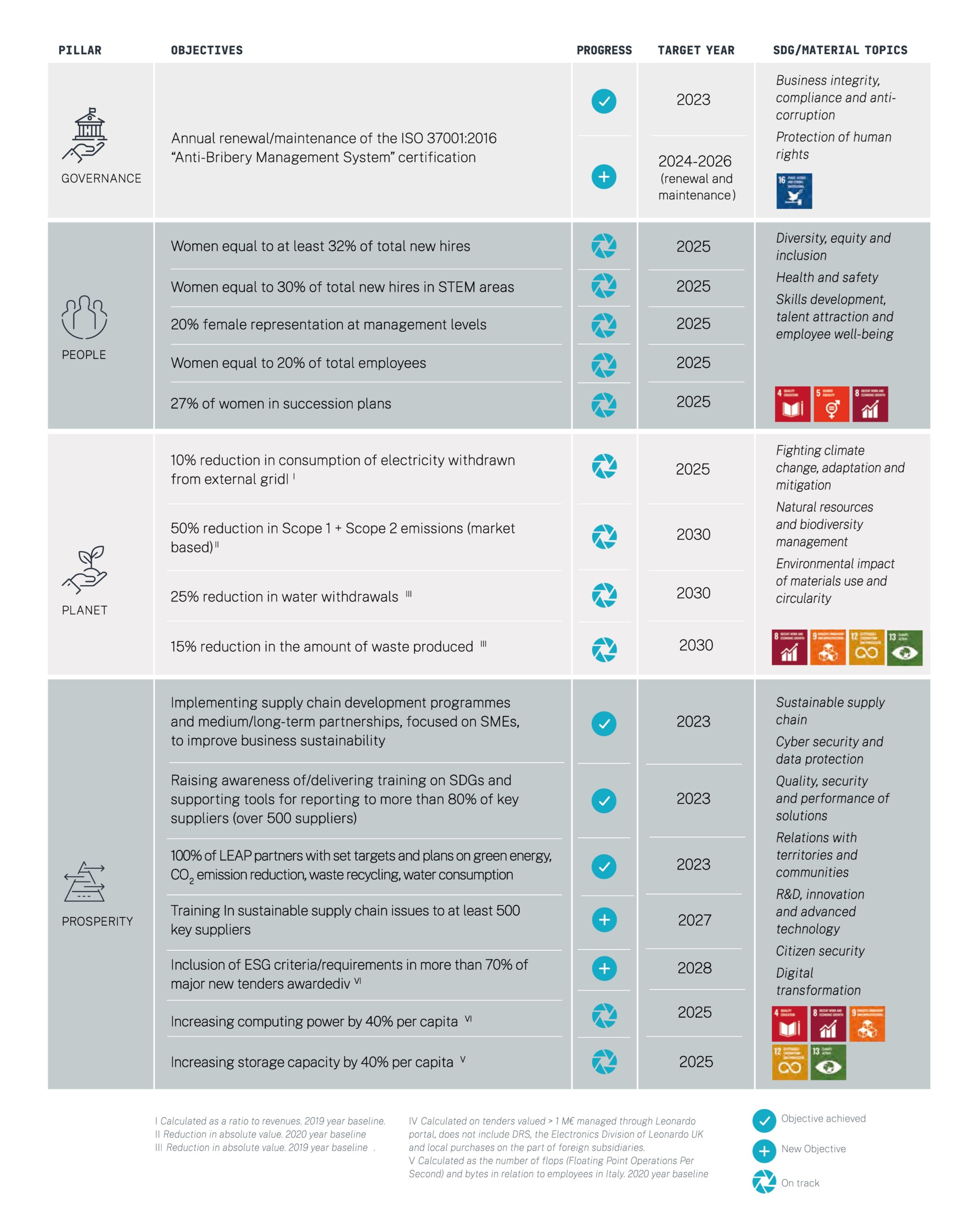Sustainability is a vital foundation for the enduring progress of people and the planet. At the heart of Leonardo’s approach are research, technological innovation and digitalisation to enable a quicker transition to inclusive and sustainable development, in line with the UN Agenda 2030 (Sustainable Development Goals) and the multi-lateral commitments at international level. Sustainability has become a key element in competitiveness by supporting innovative processes and the ability to attract talent.
of investments in 2022-2024 to achieving SDGs
people involved in R&D activities
suppliers, of which over 4,000 based in Italy
of energy purchased from renewable sources
of new employees aged under 30
of CO2 emissions (Scope 1+2)
Global leadership
Sustainability Leader in the Dow Jones Sustainability Indices of S&P Global for 14 years, with the highest score in the Aerospace and Defence industry for the fourth year in a row
Confirmed among the leaders in the fight against climate change by CDP (an international non-profit organisation), one of the best rated companies in the Aerospace & Defence sector.
Ranked in band A of the Defence Companies Index on Anti-Corruption and Corporate Transparency (DCI) of Transparency International.
Sustainability Governance
The Board of Directors, assisted by the Sustainability and Innovation Committee and the Risk and Control Committee, defines the strategic guidelines on sustainability and supports the pursuit of sustainable value creation for our shareholders and stakeholders in the medium to long term.
Sustainability targets

Materiality Analysis
The definition of a sustainable strategy for Leonardo is also based on materiality analysis, the key process for identifying the issues representative of the impacts generated by the Company (material issues) on planet, people, society and the economy, including human rights, integrating the perspectives of key interest groups into the management vision. The analysis supports and guides the identification of strategic objectives, the definition of the Sustainability Plan and the elaboration of the Annual Integrated Budget.
In 2023, this process directly involved over 500 external and internal stakeholders, representing 13 categories of stakeholders relevant to the Group, its management, and the Board of Directors, in order to catch all the main issues of the ecosystem in which Leonardo operates . The process took place in 3 phases: the analysis and understanding of the regulatory context, the identification of impacts and the assessment of their significance, also carried out through the involvement of internal and external stakeholders. The results of the analysis made it possible to define material topics for the Group, approved by Top Management.
Stakeholders
Leonardo’s sustainability strategy integrates the stakeholders’ perspective. This vision is founded on dialogue and listening, consolidated by engagement activities, such as the process that led to the definition of the material topics (materiality analysis).
GOVERNMENTS AND INSTITUTIONS
- Dialogue with domestic, supranational and regional institutions
- Organization of round tables with government, institutions and industry representatives
- Participation in round tables with public and private companies/bodies for the development of initiatives, plans and policies
- Support to initiatives aimed at increasing security and the ecological and digital transitions (e.g. PNRR in Italy)
FUTURE GENERATIONS
- Initiatives that support schools and higher education providers to increase teaching of technical and scientific subjects (STEM), helping with careers in those sectors and increasing skills
- Promotion of diversity and inclusion as competitiveness factors
- Spreading scientific citizenship through initiatives aimed at sharing knowledge, technological skills and innovation to help the communities and territories that Leonardo is active in
FINANCIAL COMMUNITY
- Events and conference calls for the presentation of interim results
- Regular communications with analysts and investors (current and potential) about financial matters and ESG also through events and roadshows
- Participation in conferences
EMPLOYEES
- Support, coaching and networking programmes
- Support for welfare and work-life balance
- Provision of cultural events and services for employees and families
- Annual performance evaluation
- Training and engagement activities to spread knowledge on sustainability matters and to encourage employees to become involved
- Periodical surveys on company sentiment and specific surveys on mobility, smart working and sustainability topics
- Survey on women with STEM profiles
SUPPLIERS
- Promotion of supply chain sustainability through initiatives focused on digital transformation, cyber & security and social and environmental responsibility
- Training on sustainability matters
- Assessment of ESG performance (Environmental, Social, Governance)
- Supplier Awards
CUSTOMERS
- Dedicated conferences and user groups
- Customer satisfaction surveys
- Digital events and trade shows
UNIVERSITIES AND RESEARCH CENTRES
- Development of innovative and sustainable solutions through research projects and collaborations with business areas and Leonardo Labs
- Partnerships and collaborations in the fields of research and innovation to fight climate change, to use resources more efficiently and to favour circular economy initiatives
- Guidance-related initiatives and scholarships to increase STEM skills, promoting dialogue between industry and universities
BUSINESS PARTNER
- Implementation of projects to improve efficiency in industrial practices
- Participation in domestic and international research projects, round tables and multi-sector consultations
- Starting circular economy and industrial symbiosis projects
LOCAL COMMUNITIES
- Supporting and organising local initiatives and digital events benefitting communities and territories which Leonardo is active in
- Opening the company’s sites and museums to the public
- Promotion of volunteering opportunities by employees
TRADE ASSOCIATIONS
- Participation in round tables on technological, sustainability, social, environmental and governance/policy matters
- Sharing of best practices and case studies in events, workshops and publications.
TRADE UNIONS
- Continuous dialogue with trade unions
- Participation and creation of observatories and committees on specific subjects, such as equal opportunities and diversity
MEDIA
- Communication via traditional and digital media
- Collaborations in publishing initiatives and events
In 2022, the value of lobbying contracts was approximately $1.7 million (approximately $1.8 million in 2021 and 2020, approximately $1 million in 2017) and is related to activities carried out mainly in North America and Poland, Germany and Brazil.
Leonardo
Piazza Monte Grappa, 4
00195 Rome - Italy
Raffaella Luglini
Chief Sustainability Officer


